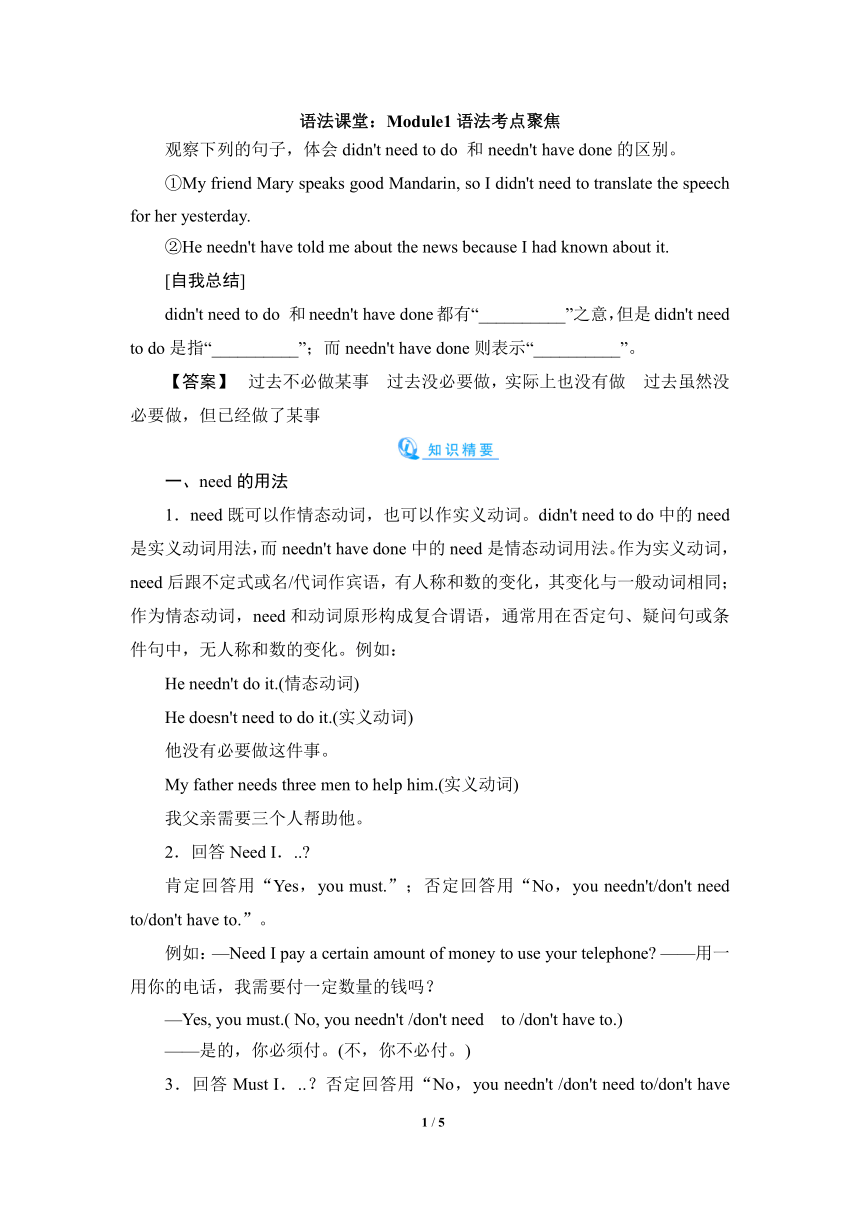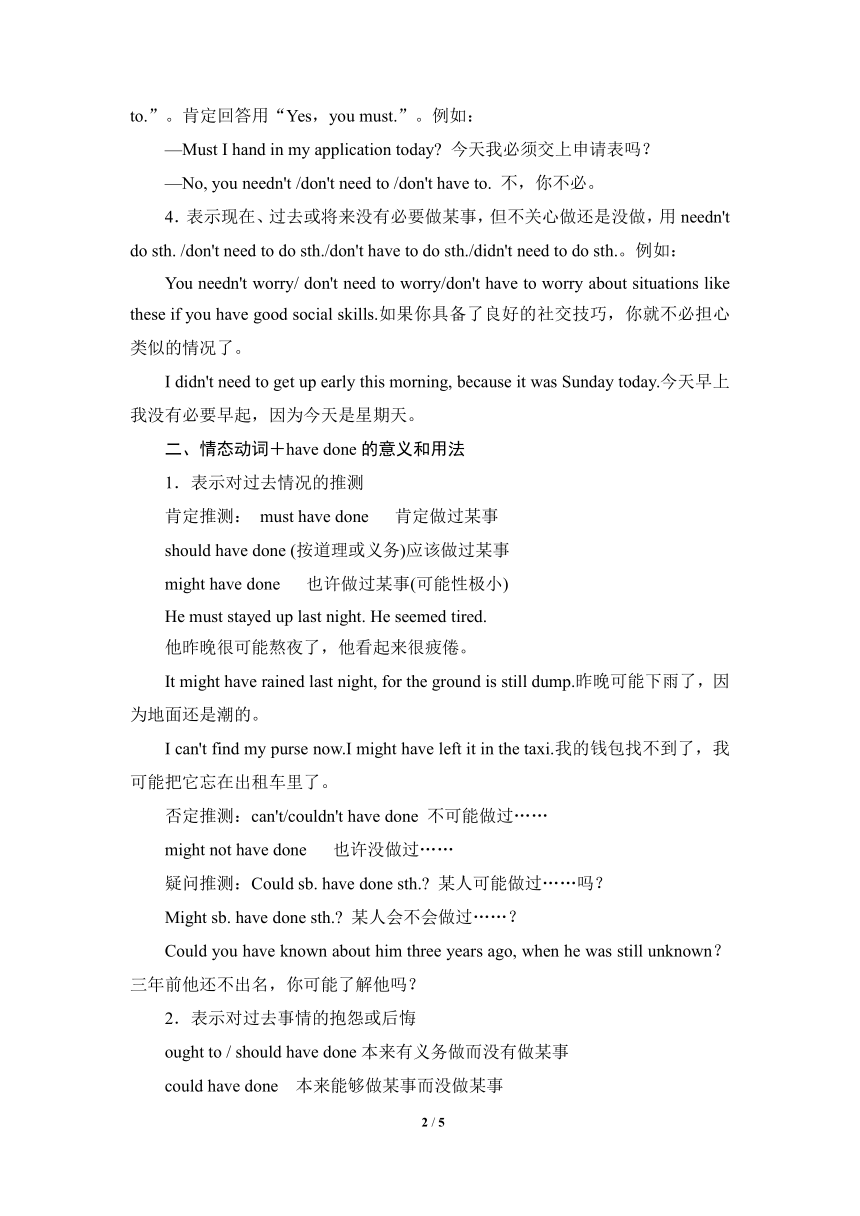外研版 选修6 Module 1 Small Talk 语法课堂:语法考点聚焦 学案
文档属性
| 名称 | 外研版 选修6 Module 1 Small Talk 语法课堂:语法考点聚焦 学案 |

|
|
| 格式 | doc | ||
| 文件大小 | 60.5KB | ||
| 资源类型 | 教案 | ||
| 版本资源 | 外研版 | ||
| 科目 | 英语 | ||
| 更新时间 | 2023-02-17 12:02:20 | ||
图片预览


文档简介
语法课堂:Module1语法考点聚焦
观察下列的句子,体会didn't need to do 和needn't have done的区别。
①My friend Mary speaks good Mandarin, so I didn't need to translate the speech for her yesterday.
②He needn't have told me about the news because I had known about it.
[自我总结]
didn't need to do 和needn't have done都有“__________”之意,但是didn't need to do是指“__________”;而needn't have done则表示“__________”。
【答案】 过去不必做某事 过去没必要做,实际上也没有做 过去虽然没必要做,但已经做了某事
一、need的用法
1.need既可以作情态动词,也可以作实义动词。didn't need to do中的need是实义动词用法,而needn't have done中的need是情态动词用法。作为实义动词,need后跟不定式或名/代词作宾语,有人称和数的变化,其变化与一般动词相同;作为情态动词,need和动词原形构成复合谓语,通常用在否定句、疑问句或条件句中,无人称和数的变化。例如:
He needn't do it.(情态动词)
He doesn't need to do it.(实义动词)
他没有必要做这件事。
My father needs three men to help him.(实义动词)
我父亲需要三个人帮助他。
2.回答Need I...
肯定回答用“Yes,you must.”;否定回答用“No,you needn't/don't need to/don't have to.”。
例如:—Need I pay a certain amount of money to use your telephone ——用一用你的电话,我需要付一定数量的钱吗?
—Yes, you must.( No, you needn't /don't need to /don't have to.)
——是的,你必须付。(不,你不必付。)
3.回答Must I...?否定回答用“No,you needn't /don't need to/don't have to.”。肯定回答用“Yes,you must.”。例如:
—Must I hand in my application today 今天我必须交上申请表吗?
—No, you needn't /don't need to /don't have to. 不,你不必。
4.表示现在、过去或将来没有必要做某事,但不关心做还是没做,用needn't do sth. /don't need to do sth./don't have to do sth./didn't need to do sth.。例如:
You needn't worry/ don't need to worry/don't have to worry about situations like these if you have good social skills.如果你具备了良好的社交技巧,你就不必担心类似的情况了。
I didn't need to get up early this morning, because it was Sunday today.今天早上我没有必要早起,因为今天是星期天。
二、情态动词+have done的意义和用法
1.表示对过去情况的推测
肯定推测: must have done 肯定做过某事
should have done (按道理或义务)应该做过某事
might have done 也许做过某事(可能性极小)
He must stayed up last night. He seemed tired.
他昨晚很可能熬夜了,他看起来很疲倦。
It might have rained last night, for the ground is still dump.昨晚可能下雨了,因为地面还是潮的。
I can't find my purse now.I might have left it in the taxi.我的钱包找不到了,我可能把它忘在出租车里了。
否定推测:can't/couldn't have done 不可能做过……
might not have done 也许没做过……
疑问推测:Could sb. have done sth. 某人可能做过……吗?
Might sb. have done sth. 某人会不会做过……?
Could you have known about him three years ago, when he was still unknown?三年前他还不出名,你可能了解他吗?
2.表示对过去事情的抱怨或后悔
ought to / should have done本来有义务做而没有做某事
could have done 本来能够做某事而没做某事
need have done 本需要做某事但未做某事
would like / rather have done 本想做某事但没做
You should have cleaned the room. After all, you were on duty yesterday.
你本应该打扫房间,毕竟,昨天该你值日。
You should have been more careful just now.
你刚才应该更小心些。
I would like to have gone to the concert with you. A friend of mine called on me.
我本来想和你一起去听音乐会。但我的一个朋友来了。
1.(2012 江西高考)We ________ have bought so much food now that Suzie won't be with us for dinner.
A.may not B.needn't C.can't D.mustn't
【解析】 情态动词表示推测。本题要注意后面的now that从句:Suzie不与我们一起吃饭。所以前面是在说我们本没有必要,needn't have done主要表示某事已经做了,但后来觉得没必要去做,因此常含有责备或遗憾之意,译成汉语通常是“本来不必……”,句意:我们本来不必买这么多食物的,既然Suzie不与我们一起吃饭。
【答案】 B
2.(2012 江苏高考)— Happy birthday!
—Thank you! It's the best present I ________ for.
A.should have wished B.must have wished
C.may have wished D.could have wished
【解析】 情态动词+完成式。A项意为“本应该期望而实际上并非如此”;B项意为“一定希望”;C项意为“也许希望”;D项意为“可能希望”。句意:——生日快乐!——谢谢你!这是我所能期望的最好的礼物了。根据句意可知,应选D项。
【答案】 D
3.(2012 浙江高考)Had they known what was coming next, they________ second thoughts.
A.may have B.could have
C.must have had D.might have had
【解析】 虚拟语气中的情态动词。本句是一个倒装句,可还原为:If they had known what was coming next, they might have had second thought.。根据had known提示,可知是与过去事实相反,因此虚拟语气主句中应该用would/might +have done,由此可见答案D符合语境。
【答案】 D
4.(2013 陕西高考)The children ________lost in the woods; otherwise, they would have been at the lakeside camp as scheduled.
A.must have got B.must get
C.should have got D.should get
【解析】 考查情态动词。副词otherwise之前的句子表示推测,之后的句子表示虚拟。句意:孩子们肯定在树林里迷路了;否则的话,他们就该按计划在湖边的宿营地了。故选A,must have done表示对过去发生事情的肯定推测,意为“过去肯定已经……”。
【答案】 A
5.(2013 四川高考)—Why are your eyes so red?You ________ have slept well last night.
—Yeah, I stayed up late writing a report.
A.can't B.mustn't C.needn't D.won't
【解析】 考查情态动词。根据语境“眼睛那么红,昨晚不可能睡得很好”可知,此处考查情态动词can的否定式can't表推测,意为“不可能”。can't have done表示对过去的推测,意为“过去不可能……”。故选A。
【答案】 A
Ⅱ.完成句子
1.John went to the station with the car to meet Mary, so she ____________ (本来没必要步行) back home.
2.I ____________ (不必早起床) this morning,so I stayed in bed until 9 a.m..
3.You ____________ (根本不需要去) there yesterday.
4.Your clothes ____________ (需要洗了).
5.You ________ (不必完成) the work today.
【答案】 1.needn't have walked 2.didn't need to get up early 3.needn't have gone 4.need washing/ to be washed 5.needn't finish
5 / 5
观察下列的句子,体会didn't need to do 和needn't have done的区别。
①My friend Mary speaks good Mandarin, so I didn't need to translate the speech for her yesterday.
②He needn't have told me about the news because I had known about it.
[自我总结]
didn't need to do 和needn't have done都有“__________”之意,但是didn't need to do是指“__________”;而needn't have done则表示“__________”。
【答案】 过去不必做某事 过去没必要做,实际上也没有做 过去虽然没必要做,但已经做了某事
一、need的用法
1.need既可以作情态动词,也可以作实义动词。didn't need to do中的need是实义动词用法,而needn't have done中的need是情态动词用法。作为实义动词,need后跟不定式或名/代词作宾语,有人称和数的变化,其变化与一般动词相同;作为情态动词,need和动词原形构成复合谓语,通常用在否定句、疑问句或条件句中,无人称和数的变化。例如:
He needn't do it.(情态动词)
He doesn't need to do it.(实义动词)
他没有必要做这件事。
My father needs three men to help him.(实义动词)
我父亲需要三个人帮助他。
2.回答Need I...
肯定回答用“Yes,you must.”;否定回答用“No,you needn't/don't need to/don't have to.”。
例如:—Need I pay a certain amount of money to use your telephone ——用一用你的电话,我需要付一定数量的钱吗?
—Yes, you must.( No, you needn't /don't need to /don't have to.)
——是的,你必须付。(不,你不必付。)
3.回答Must I...?否定回答用“No,you needn't /don't need to/don't have to.”。肯定回答用“Yes,you must.”。例如:
—Must I hand in my application today 今天我必须交上申请表吗?
—No, you needn't /don't need to /don't have to. 不,你不必。
4.表示现在、过去或将来没有必要做某事,但不关心做还是没做,用needn't do sth. /don't need to do sth./don't have to do sth./didn't need to do sth.。例如:
You needn't worry/ don't need to worry/don't have to worry about situations like these if you have good social skills.如果你具备了良好的社交技巧,你就不必担心类似的情况了。
I didn't need to get up early this morning, because it was Sunday today.今天早上我没有必要早起,因为今天是星期天。
二、情态动词+have done的意义和用法
1.表示对过去情况的推测
肯定推测: must have done 肯定做过某事
should have done (按道理或义务)应该做过某事
might have done 也许做过某事(可能性极小)
He must stayed up last night. He seemed tired.
他昨晚很可能熬夜了,他看起来很疲倦。
It might have rained last night, for the ground is still dump.昨晚可能下雨了,因为地面还是潮的。
I can't find my purse now.I might have left it in the taxi.我的钱包找不到了,我可能把它忘在出租车里了。
否定推测:can't/couldn't have done 不可能做过……
might not have done 也许没做过……
疑问推测:Could sb. have done sth. 某人可能做过……吗?
Might sb. have done sth. 某人会不会做过……?
Could you have known about him three years ago, when he was still unknown?三年前他还不出名,你可能了解他吗?
2.表示对过去事情的抱怨或后悔
ought to / should have done本来有义务做而没有做某事
could have done 本来能够做某事而没做某事
need have done 本需要做某事但未做某事
would like / rather have done 本想做某事但没做
You should have cleaned the room. After all, you were on duty yesterday.
你本应该打扫房间,毕竟,昨天该你值日。
You should have been more careful just now.
你刚才应该更小心些。
I would like to have gone to the concert with you. A friend of mine called on me.
我本来想和你一起去听音乐会。但我的一个朋友来了。
1.(2012 江西高考)We ________ have bought so much food now that Suzie won't be with us for dinner.
A.may not B.needn't C.can't D.mustn't
【解析】 情态动词表示推测。本题要注意后面的now that从句:Suzie不与我们一起吃饭。所以前面是在说我们本没有必要,needn't have done主要表示某事已经做了,但后来觉得没必要去做,因此常含有责备或遗憾之意,译成汉语通常是“本来不必……”,句意:我们本来不必买这么多食物的,既然Suzie不与我们一起吃饭。
【答案】 B
2.(2012 江苏高考)— Happy birthday!
—Thank you! It's the best present I ________ for.
A.should have wished B.must have wished
C.may have wished D.could have wished
【解析】 情态动词+完成式。A项意为“本应该期望而实际上并非如此”;B项意为“一定希望”;C项意为“也许希望”;D项意为“可能希望”。句意:——生日快乐!——谢谢你!这是我所能期望的最好的礼物了。根据句意可知,应选D项。
【答案】 D
3.(2012 浙江高考)Had they known what was coming next, they________ second thoughts.
A.may have B.could have
C.must have had D.might have had
【解析】 虚拟语气中的情态动词。本句是一个倒装句,可还原为:If they had known what was coming next, they might have had second thought.。根据had known提示,可知是与过去事实相反,因此虚拟语气主句中应该用would/might +have done,由此可见答案D符合语境。
【答案】 D
4.(2013 陕西高考)The children ________lost in the woods; otherwise, they would have been at the lakeside camp as scheduled.
A.must have got B.must get
C.should have got D.should get
【解析】 考查情态动词。副词otherwise之前的句子表示推测,之后的句子表示虚拟。句意:孩子们肯定在树林里迷路了;否则的话,他们就该按计划在湖边的宿营地了。故选A,must have done表示对过去发生事情的肯定推测,意为“过去肯定已经……”。
【答案】 A
5.(2013 四川高考)—Why are your eyes so red?You ________ have slept well last night.
—Yeah, I stayed up late writing a report.
A.can't B.mustn't C.needn't D.won't
【解析】 考查情态动词。根据语境“眼睛那么红,昨晚不可能睡得很好”可知,此处考查情态动词can的否定式can't表推测,意为“不可能”。can't have done表示对过去的推测,意为“过去不可能……”。故选A。
【答案】 A
Ⅱ.完成句子
1.John went to the station with the car to meet Mary, so she ____________ (本来没必要步行) back home.
2.I ____________ (不必早起床) this morning,so I stayed in bed until 9 a.m..
3.You ____________ (根本不需要去) there yesterday.
4.Your clothes ____________ (需要洗了).
5.You ________ (不必完成) the work today.
【答案】 1.needn't have walked 2.didn't need to get up early 3.needn't have gone 4.need washing/ to be washed 5.needn't finish
5 / 5
